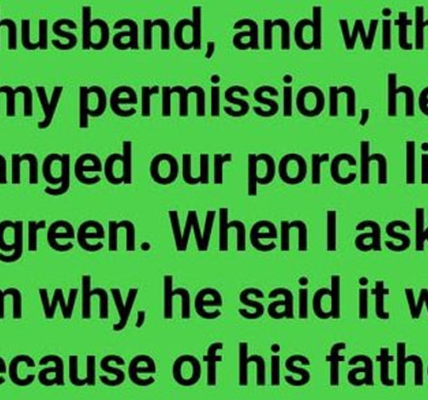- Homepage
- Interesting
- After my husband died, my mother‑in‑law leaned toward my daughter and whispered, “I’ll take you from her.”
After my husband died, my mother‑in‑law leaned toward my daughter and whispered, “I’ll take you from her.”
After my husband died, my mother‑in‑law leaned toward my daughter and whispered, “I’ll take you from her.”

After my husband died, I packed two suitcases, wrapped my daughter’s favorite blanket around her shoulders, and drove to my mother‑in‑law’s big brick house on Maple Street. I told myself that living under the same roof would help all of us. We were three broken pieces of the same family, and I thought we could fit together and become whole again.
For the first few hours it seemed almost possible. My daughter Lila followed her grandma through the quiet halls, touching the polished furniture and the framed pictures of her father when he was a boy. Sylvia—my mother‑in‑law—brought us cocoa and spoke in a soft voice, as though loud sounds might shatter the air. I tried to believe we would heal side by side.
That hope ended the night I heard Sylvia’s secret promise.
It happened after dinner while I was carrying dishes to the sink. The house was so silent I could hear the clock ticking in the next room. Lila’s little shoes tapped down the hallway toward the guest bedroom. I was just about to call her back for a bath when Sylvia’s whisper slid around a corner.
“I’ll take you from her,” she breathed.
My heart stopped. Water poured over my hand from the running faucet, but I felt nothing except the cold wave of fear swelling in my chest. I set the plates down, dried my palms on a towel, and walked quietly to the doorway. Through the crack I saw Sylvia kneeling in front of Lila, brushing a curl from the child’s cheek.
“Grandma will keep you safe,” she murmured. “Soon you’ll stay with me all the time.”
That was the moment I knew I was in a fight I had never expected. Grief was no longer my only enemy. I would have to protect my child from her own grandmother.
The battle truly started one windy morning at the cemetery, the day we laid my husband Eric in the ground. Even now I taste the sharp air and smell the wet earth. I stood at the edge of the open grave with Lila in my arms. Her small fists held the collar of my coat like she feared I would drift away if she let go. Behind us the priest read his lines, but the words reached me as distant echoes, as though I were listening from underwater.
The coffin rested at the bottom of the hole, surrounded by tangled roots and dark soil. I wanted to climb down, lie on the smooth wood, and close my eyes forever beside the man I loved. Eric had been my best friend, my partner in every plan, the person who laughed at my terrible jokes and cried with me when life hurt. Losing him felt like losing the sun.
Yet I stayed on my feet because a tiny girl needed me more than I needed the grave.
Lila pressed her face to my shoulder. “Mommy, why are they putting Daddy down there?” she asked, voice trembling. “He won’t be able to breathe.”
I bit the inside of my cheek to keep from sobbing. “Sweetheart, Daddy’s body doesn’t need to breathe anymore,” I said slowly, choosing each word like it might break. “His pain is gone. He’s resting.”
“It’s so dark,” she whispered. “He’ll be cold.”
I hugged her tighter. The only warmth I could offer was my own body. All the while the world kept turning, not caring that the best part of my life had ended because a stranger ran a red light.
When the short service ended we drove back to our house. Eric’s mother rode up front while I watched rain stripe the windshield. Lila fell asleep before we reached the driveway, tears still shining on her cheeks. I carried her inside and felt his absence press down on me like deep water. His jacket still hung on the hook. His favorite mug sat on the counter. Everything looked the same, and nothing felt right.
Sylvia took off her gloves. “I’ll make tea,” she said.
I nodded, kissed Lila’s forehead, and laid her on the couch. For a while I just stood there listening to her steady breathing, reminding myself that one of us must stay strong. Then I entered the kitchen. Steam curled from two mugs. I wrapped my hands around mine, glad for the heat.
“You can’t handle this alone, Dana,” Sylvia said, touching my arm.
“I don’t have a choice,” I answered.
“There is always a choice.” Her tone was gentle, but a current of iron ran beneath it. “Come live with me. My house is quiet. Lila will have her own room. You’ll have space to grieve.”
I remembered the early years of my marriage, how Sylvia had called me “that girl” when she thought I couldn’t hear. She came from money and had never trusted a working‑class daughter‑in‑law. But I was too tired to argue, too afraid of the nights ahead inside walls that smelled like Eric.
“Okay,” I whispered.
Sylvia’s house looked like a picture in a magazine—high ceilings, pale carpets, shining windows that caught the morning light. She gave Lila the room beside hers, painted yellow with daisies on the curtains. My room sat at the far end of the hall.
I carried our bags upstairs and paused in the doorway of Lila’s new space. Stuffed animals waited on the neatly made bed. A shelf of storybooks lined one wall. Any other child would have bounced with joy, but Lila only stared, thumb in mouth, searching for something familiar.
“Why can’t my room be next to Mommy’s?” she asked.
Before I could reply, Sylvia swept in. “This way Grandma can hear you if you need anything at night.” She smiled, but her eyes held a warning: do not argue.
I let it go. I told myself it was only for a short while.
That first night Lila crept down the hall and climbed under my covers, sobbing. She clung so tightly I thought my ribs would crack. I stroked her hair until she slept, and I stayed awake watching the shadows change shape on the ceiling.
At dawn Sylvia knocked on my door. “You should not share a bed with her,” she said.
“She was scared,” I answered.
“You’ll make her clingy.” She folded her arms. “I’m hiring a nanny. Full‑time.”
“No,” I said, heart racing. “I can look after my own child.”
“It is done,” she replied, voice like closing doors. Then she walked away.
Over the next weeks I felt Lila drifting from me as if an invisible hand were pulling her rope. It started small. She asked her grandma for apple juice even when I stood beside the fridge. She reached for Sylvia’s hand instead of mine when we crossed the street. One afternoon she brushed my kiss off her forehead.
“What’s happening, baby?” I asked.
She gave me a puzzled look, as if she had forgotten why a mother’s arms should feel safe.
I confronted Sylvia that evening while the nanny read to Lila. “You’re turning her against me.”
Sylvia lifted a brow. “Children choose who makes them comfortable.”
“She is five,” I snapped. “She needs her mother.”
“She needs stability,” Sylvia countered. “You are not stable.”
The words stumbled through my mind for hours afterward. I started doubting myself—maybe I did cry too often, maybe my hands did shake when I poured cereal. Grief makes thinking hard.
Still, nothing prepared me for the night the truth came out.
I tried again to tuck Lila into bed myself. The moment I stepped into her room she shrank against the headboard and screamed. “Go away! I want Grandma!”
The scream ripped something inside me. I left the door open behind me and slid down the hallway wall, head in my hands. Sylvia appeared, calm as ever.
“She doesn’t want you,” she said.
A fresh sob clawed my throat. “What did you tell her?”
“I will take care of everything,” she said. “You need rest.”
She went inside and shut the door, but I stayed—knees pressed to the cool floorboards, ear near the keyhole.
“It’s alright, baby,” Sylvia soothed. “I will take you from her.”
“Because she’s a bad mommy?” Lila sniffed.
“Yes. She isn’t good for you.”
Ice spread through my veins. I stood when Sylvia opened the door.
“Are you out of your mind?” I hissed.
She pressed a finger to her lips. “Lower your voice.”
You’re stealing my child!”
“She’s all I have left,” Sylvia said quietly. “I will do whatever I must. You have no job, no house, no proof that anything belongs to you. Who do you think the court will choose?”
My knees wobbled, but anger kept me upright. “The house was Eric’s. He signed papers.”
“Find them,” she mocked. “They burned in the fireplace weeks ago.”
I did not sleep. I lay awake planning, remembering every document Eric had ever signed, every story he had told me about wills and lawyers and safety.
Morning brought worse news. Sylvia stood in the living room with a man in a gray suit. “We have already filed for custody,” she declared.
My legs shook. “Why? We’re already here.”
“I don’t want you here. I tolerated you for Eric’s sake. Now I can keep Lila without your weakness near her.”
I fled to my room and searched drawers for anything useful. Soon my fingers closed around a small white card: Kline, Attorney‑at‑Law. Eric had trusted him. I dialed the number.
“It’s happening, isn’t it?” he asked, voice steady.
“Yes,” I breathed.
“Come to my office.”
Kline was tall, kind‑eyed, and sure of himself. He poured coffee, handed me tissues, and listened. Then he opened a locked drawer and pulled out a folder.
“Eric was careful,” he said. “He feared his mother might try something if tragedy struck. He left copies of every important paper with me.”
Inside the folder lay a copy of the deed to our home—signed, stamped, and clear as day—plus Eric’s will leaving all his assets to Lila and me.
A shaky laugh escaped me. “Can we win?”
“You will,” Kline promised. “We’ll file our own petition before lunch.”
The hearing took place three weeks later in a small courtroom that smelled of old wood and stale coffee. Sylvia wore a dark dress and pearls, her face calm. Her lawyer painted me as unstable. He spoke of my lack of income and called me “emotionally fragile.” My stomach churned.
Then Kline stood. He spoke slowly so every word landed like a nail. He handed the judge the deed and the will. He explained that Eric’s house was now mine and that I had funds to provide. Finally he revealed a statement from Lila’s school counselor describing the bond between mother and daughter before the grandmother’s interference.
The judge’s gavel struck once. Custody stayed with me. Sylvia’s petition was dismissed.
Outside the courthouse wind rattled the fountain. Sylvia stepped close, eyes hard. “How did you manage that?”
“Eric protected us,” I said. “This ends now. Stay away from my daughter.”
Her lips tightened. “You won because of a piece of paper. But you are still weak.”
“No,” I replied. “I am strong enough to fight for my child.”
I turned my back on her and walked to the car where Lila waited with Kline’s assistant. She looked up at me, fear and hope tangled on her small face.
“Mommy, are you going to give me away?” she whispered. “Grandma said you might.”
I knelt until we were eye level. “Never, Lila. I went to court today to make sure nobody can ever take you from me.”
She threw her arms around my neck, and I held her so tight the world could not slip between us.
We drove not to Sylvia’s house, but to the little blue house Eric had loved. Sunlight filtered through the living‑room window onto the floor where Lila spread her toys. I hung Eric’s jacket back on its hook and breathed in the faint scent of cedar and soap. For the first time since his funeral, the weight on my chest eased a little.
Night came. I tucked Lila into her own bed—in a room next to mine—and sat with her until her eyes closed. Before I left she asked, “Mommy, are we safe now?”
“Yes,” I whispered. “Daddy and I made sure of it.”
I switched off the lamp. In the hallway I touched the wall, feeling the solid wood under my palm. This house was ours, this life was ours, and I would guard both with everything I had. Eric had trusted me to raise our daughter with courage, and I would not fail him.
Outside, the wind moved through the trees, but indoors the air felt calm. I stood in the quiet and let myself believe that tomorrow, though still full of sorrow, would also hold space for hope—hope built on the unbreakable bond between a mother and her child.




